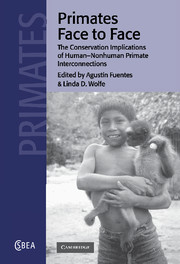Book contents
- Frontmatter
- Contents
- List of contributors
- Foreword
- Acknowledgements
- Introduction
- Part 1 Science and nonhuman primates
- Part 2 Cultural views of nonhuman primates
- Part 3 Conservation of nonhuman primates
- 9 Monkeys, humans and politics in the Mentawai Islands: no simple solutions in a complex world
- 10 Conservation must pursue human–nature biosynergy in the era of social chaos and bushmeat commerce
- 11 A cultural primatological study of Macaca fascicularis on Ngeaur Island, Republic of Palau
- 12 Monkeys in the backyard: encroaching wildlife and rural communities in Japan
- Part 4 Government actions, local economies and nonhuman primates
- Index
9 - Monkeys, humans and politics in the Mentawai Islands: no simple solutions in a complex world
Published online by Cambridge University Press: 20 October 2009
- Frontmatter
- Contents
- List of contributors
- Foreword
- Acknowledgements
- Introduction
- Part 1 Science and nonhuman primates
- Part 2 Cultural views of nonhuman primates
- Part 3 Conservation of nonhuman primates
- 9 Monkeys, humans and politics in the Mentawai Islands: no simple solutions in a complex world
- 10 Conservation must pursue human–nature biosynergy in the era of social chaos and bushmeat commerce
- 11 A cultural primatological study of Macaca fascicularis on Ngeaur Island, Republic of Palau
- 12 Monkeys in the backyard: encroaching wildlife and rural communities in Japan
- Part 4 Government actions, local economies and nonhuman primates
- Index
Summary
Introduction
Nonhuman primates are the focus of a wide array of investigations relating to human primates. Physiological models, evolutionary models, primatewide trends in anatomy, and behavior are but a few of these foci. Many of these investigations are fruitful and rewarding to several branches of scientific knowledge. Here, however, I would like to take a slightly different direction and discuss nonhuman primates not as a model for humans but rather as sympatric, and evolutionarily similar, participants in a rapidly changing ecosystem. In many areas of the world, human and nonhuman primates are experiencing similar challenges brought about by changing ecological, social and economic realities. Although nonhuman primate behavior and ecology, human ecology, and conservation are all broad fields by themselves, it is my contention that the third (conservation) is most effective when the first two are merged and treated as a unified area of investigation. I hope to demonstrate here that by incorporating elements of human cultural ecology, nonhuman primate behavior and ecology into a broad picture of a dynamic ecosystem we may have a better chance of either successfully assessing ongoing conservation status or implementing new conservation programs.
Ecology is (grossly) the entire set of interactions between organisms and their environment.
- Type
- Chapter
- Information
- Primates Face to FaceThe Conservation Implications of Human-nonhuman Primate Interconnections, pp. 187 - 207Publisher: Cambridge University PressPrint publication year: 2002
- 14
- Cited by

